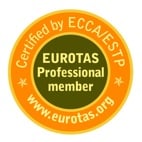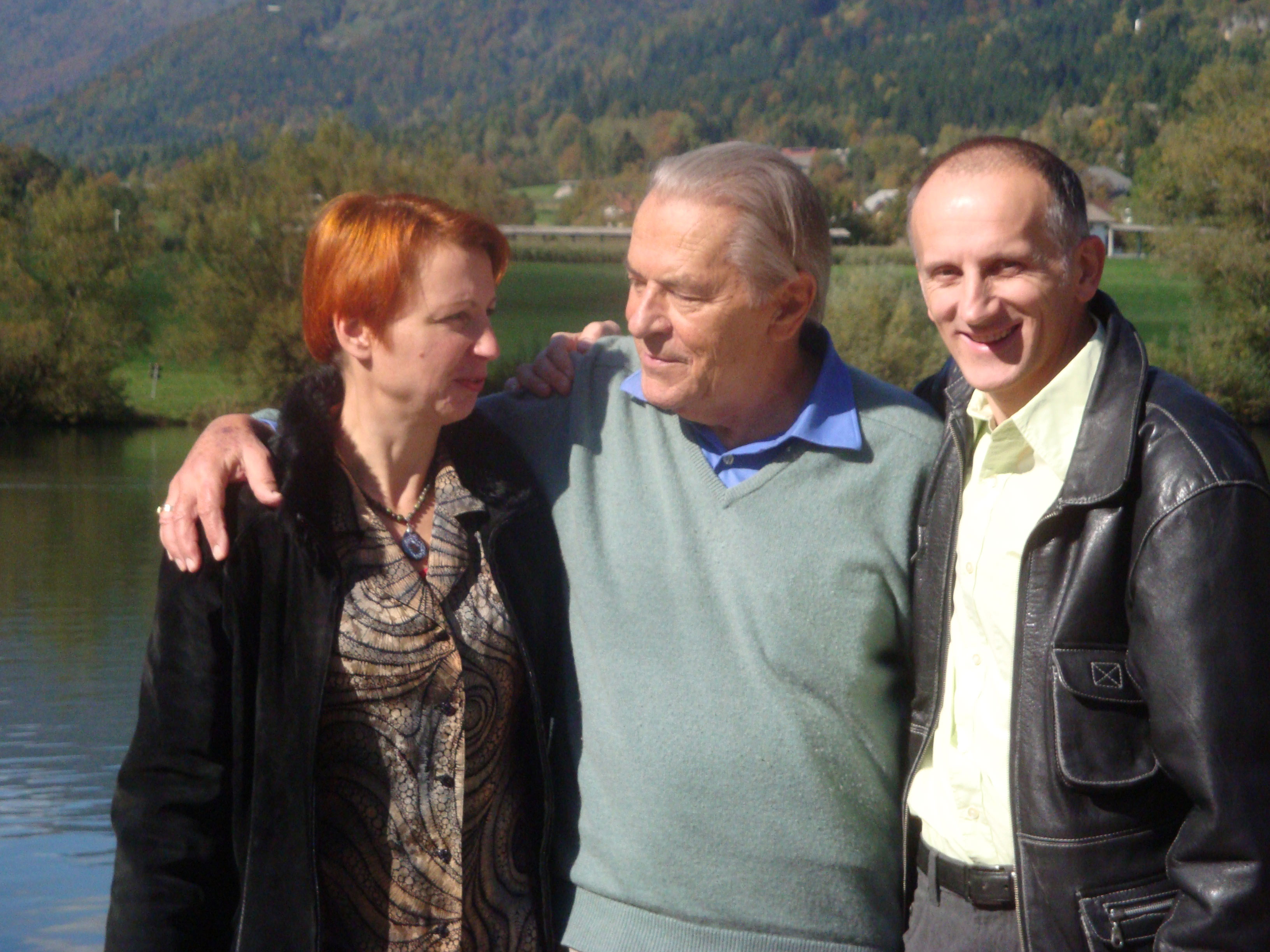

"LSD is a catalyst or amplifier of mental processes. If used properly, it could become something like a microscope or a telescope for psychotherapy."
— Stanislav Grof, pioneer of psychedelic therapy
Organizational Framework of the Training Program
In 2025, a unique opportunity opens for enrollment in a one-year training program for psychotherapists and other professionals in helping professions. The program will focus on counseling and psychotherapeutic support for the preparation and integration of experiences in non-ordinary states of consciousness (NOSC), including clients with psychedelic experiences. The training will be conducted under the auspices of the Ljubljana branch of Sigmund Freud University in Vienna (SFU Ljubljana) in collaboration with the Velosimed Center.
Free informational seminars on the topic Supportive Work with Non-Ordinary States of Consciousness: Preparation and Integration, led by Mojca Studen, will be held:
- IN PERSON on Tuesday, November 19, 2024, from 6:30 PM to 9:00 PM at SFU Ljubljana, Trubarjeva 65, Lecture Hall P4
- ONLINE via Zoom on Monday, November 25, 2024, from 6:30 PM to 9:00 PM
The seminars are designed to present the theoretical and practical content of the one-year training program, enabling potential participants to make a more informed decision about joining.
Zoom video:
In counseling and psychotherapeutic work, we increasingly encounter clients seeking either healing of psychological wounds or personal and spiritual growth through workshops, methods, and techniques that provide experiences in non-ordinary states of consciousness (NOSC). In some cases, clients seek work with NOSC as a supplement to therapy, while in others, they require support for integrating NOSC experiences after encountering facilitators who were unable to provide adequate guidance. The integration of profound transformative experiences in NOSC can take weeks, months, or even longer.
The training for professionals focusing on supporting clients with NOSC experiences and the informed use of psychoactive substances (PAS) includes understanding NOSC experiences, the characteristics of quality therapeutic work in NOSC, and developing a specialized set of counseling and therapeutic skills for the preparation and integration of NOSC experiences. The program also provides essential knowledge and techniques for assisting individuals undergoing a so-called "spiritual crisis." This occurs when an individual experiences a profound transformative event that may involve intense feelings of identity loss, anxiety, confusion, or a sense of mental disintegration. In such moments, appropriate support can prevent the crisis from becoming pathological or destructive and redirect it into an opportunity for growth and integration.
.
Learning Hub
Participants will gain insights into the cultural, epistemological, and anthropological dimensions of consciousness and healing, as well as ritual and cultural practices that influence transformative experiences. They will explore a transpersonal perspective on the psyche, supported by findings from neuroscience research, and become familiar with various types of therapies used in NOSC. Additionally, they will learn techniques for preparing and integrating deeply transformative processes associated with NOSC experiences, which they can offer to their clients on their journey of healing or personal/spiritual growth.
Given the growing concerns around the use of psychedelic substances as a gateway to NOSC, the training includes a dedicated module on subcultures and contemporary trends in the use of psychedelics. It also equips participants with skills to prepare clients for responsible, safe, and conscious decisions about engaging in NOSC work or determining when and for whom such work may be inadvisable.
The primary goals are for participants, upon completing the training, to:
- Integrate advanced theoretical and practical knowledge and skills in the field of therapies in NOSC in a way that respects clients' experiences while ensuring professional and responsible support throughout the therapeutic process, backed by modern scientific findings and empirically supported therapeutic approaches.
- Develop the ability to support clients in any form of therapy within NOSC, specifically in preparation for and/or integration of NOSC experiences.
- Cultivate the ability to provide support to clients undergoing a spiritual crisis.
Additionally, the purpose of the training is to:
- Raise the level of quality and safety in counseling and therapeutic work with NOSC;
- Create a network of therapists skilled in supporting clients with NOSC experiences;
- Contribute to the development of high-quality therapeutic standards in counseling and therapeutic work with NOSC through best practices.
Evaluation of the Training Program
Upon successful completion of the training, participants will receive a certificate from SFU Ljubljana confirming their participation in the program Supportive Counseling and Psychotherapeutic Work with Non-Ordinary States of Consciousness and the total number of completed hours (273 hours).

Quisque facilisis non augue nec condimentum. Integer varius vitae nisl et volutpat. Nullam sed hendrerit urna. Pellentesque sed tincidunt turpis. Sed sodales, nisi ac malesuada volutpat, nisl nibh commodo tellus, non ornare lacus mi hendrerit felis. Vestibulum ante ipsum primis in faucibus orci luctus et ultrices posuere cubilia curae; Maecenas tristique mi nec ultrices vulputate. Cras aliquet mollis quam sed pulvinar. Aliquam vestibulum leo sit amet odio venenatis, non ultrices erat blandit. Duis feugiat tellus quis turpis elementum rutrum. Fusce iaculis, tellus ut dictum rutrum, augue quam lacinia velit, sed mollis libero magna auctor tortor. Sed orci justo, bibendum nec purus sit amet, laoreet tristique ipsum.

Training Content
The program is built on four main pillars:
- Theory:
Seminars and exercises to provide a strong theoretical foundation.
- Practice:
Small group sessions where participants practice acquired techniques and methods.
- Supervision:
Both individual and group supervision to ensure professional growth and skill refinement.
- Personal Experience:
- Participants can partially choose their modes of personal NOSC experiences.
- Attendance at at least one Holotropic Breathwork workshop and the final integration workshop is mandatory.
Participation in Holotropic Breathwork workshops is possible with any certified organizer holding a GTT (Grof Transpersonal Training) or GLT (Grof Legacy Training) certification.
. Workshop list and schedule: : https://holotropic-association.eu/all-workshops or https://www.gltnordic.org/workshops/
In Slovenia: www.holotropicbreathwork.si

Main Thematic Modules of the Training Program
The content of the training program follows key guidelines, emphasizing the importance of therapists operating in compliance with legal and ethical standards, ensuring a safe and supportive environment, and assisting clients in the preparation, experience, and integration of NOSC in a way that fosters their personal growth and mental well-being. The main thematic modules of the training include:
Theoretical Framework of Therapies in NOSC:- Foundations of therapeutic approaches specific to NOSC.
- Integration of transpersonal psychology and neuroscience into practice.
- Therapeutic and Communication Skills:
- Advanced techniques for effective client communication.
- Support mechanisms to ensure client safety and well-being.
- Knowledge of Psychoactive Substances (PAS) and Their Effects:
- Overview of commonly used psychoactive substances in NOSC.
- Understanding their potential benefits, risks, and therapeutic applications.
- Preparation and Guidance for NOSC Work:
- Preparing clients for safe and meaningful NOSC experiences.
- Counseling clients on when NOSC work is suitable and when it should be avoided.
- Harm Reduction Strategies:
- Techniques for minimizing risks associated with NOSC experiences.
- Promoting client safety and responsible engagement with NOSC.
- Ethical and Legal Aspects:
- Navigating ethical dilemmas in NOSC therapy.
- Understanding the legal frameworks for working with NOSC and PAS.
- Supervision and Practical Experience:
- Gaining hands-on experience through supervised practice.
- Engaging in group and individual supervision to refine skills and receive feedback.
This comprehensive curriculum equips participants with the knowledge, skills, and ethical foundation to effectively support clients in NOSC-related therapeutic work.
Detailed Content and Thematic Modules of the Training Program
- Theoretical Framework for Therapies in NOSC:
- Introduction to scientifically grounded methods for accessing and working with NOSC to enhance therapeutic efficacy.
- Foundations of transpersonal psychology and personality typology for dynamic, process-oriented practice.
- Grof's theory of transcending ego-centered consciousness and the spiritual, mystical, and transcendent dimensions of human experience.
- Jungian theory of the unconscious, collective psyche, and archetypes.
- Neuroscientific theories of trauma and neuroplasticity.
- Cultural and societal dimensions of consciousness, emphasizing cross-cultural psychiatric approaches and anthropological perspectives on ritual and collective consciousness, including shamanism, neo-shamanism, and contemporary transpersonal practices.
This module broadens participants’ understanding of consciousness beyond Western psychological frameworks.
- Knowledge of Psychoactive Substances (PAS) and Their Effects:
- In-depth understanding of pharmacological properties, effects on the brain and body, and the potential benefits and risks of various PAS.
- Differentiating between PAS to provide appropriate guidance to clients regarding diverse NOSC experiences.
- Therapeutic and Communication Skills with Support Mechanisms:
- Developing communication skills such as “holding space,” neutral and empathetic presence, and creating a therapeutic trance.
- Bodywork, music, and other tools for sensitive and empathetic client care.
- Mastery of exploratory dialogue, non-judgmental support, and building a strong therapeutic relationship to safely integrate clients' NOSC experiences.
- Addressing disruptions in the therapeutic relationship effectively.
- Preparation and Guidance for NOSC Work:
- Assessing clients' readiness, considering context, intentions, expectations, and goals to minimize risks and optimize outcomes.
- Harm Reduction Strategies:
- Emphasizing safe practices in NOSC work and facilitating clients through spiritual crises.
- Educating clients on potential risks and how to mitigate them.
- Integration of NOSC Experiences:
- Helping clients process and reflect on NOSC experiences.
- Techniques for integrating new insights into daily life and addressing potential psychological or emotional challenges following NOSC experiences.
- Ethical and Legal Aspects:
- Adhering to the highest standards for therapeutic practice in NOSC settings.
- Understanding indications and contraindications for NOSC work, considering clients' individual needs, health history, and potential risks.
- Awareness of legal frameworks governing the use of prohibited substances to inform clients about these considerations if they pursue self-exploration.
- Research Knowledge:
- Keeping up with the latest research and clinical studies on NOSC and associated therapeutic methods.
- Effectively communicating research findings to clients in a clear and applicable manner.
- Supervision and Practical Experience:
- Supervised practical work under experienced professionals.
- Case-based learning and reflection on personal experiences in NOSC.

Scope, Methodology, and Obligations
O
Scope:
During the one-year training program, totaling 273 hours, participants are required to fulfill the following obligations:
- Introductory Meeting: 5 hours.
- Eight One-Day Seminars: 42 hours.
- Five Weekend Seminars: 85 hours.
- Seven Group Supervision Sessions: 21 hours.
- Eight Individual Supervision Sessions: 8 hours.
- At Least Six Study Triad Meetings: 18 hours.
- Harm reduction, DrogArt Support Team: 8 hours.
- One Holotropic Breathwork Workshop (Format 2+2): 32 hours.
- One Additional Workshop:
- Either a Holotropic Breathwork Workshop (Format 1+1, 20 hours)
- Or an equivalent number of sessions in other NOSC therapies (e.g., hypnotherapy, EMDR, active imagination, neuro-coaching, meditation).
- Final Meeting:
- Participants present their journey through training and integration process.
- Includes both theoretical and practical deepening in a Holotropic Breathwork workshop format, running from Thursday afternoon to Sunday afternoon, scheduled for May 2026 (34 hours).
Methodology:
The program will take place in a group setting with a minimum of 10 and a maximum of 20 participants through the following formats:
- Group Work: Interactive sessions for collective learning and sharing experiences.
- Individual Supervision: Personalized feedback and support from supervisors.
- Hands-On Practice: Small group exercises for practicing techniques in a supervised environment.
- Experiential Workshops: Personal exploration and application of NOSC techniques.
- Fieldwork: Real-life application through support and outreach program with DrogArt.
- Final Integration: Culmination of theoretical and experiential learning presented in a workshop format.
This multi-dimensional approach ensures comprehensive learning, skill development, and personal growth within a structured and supportive environment.
One-Day Seminars:
Dedicated to theory, practice, and contemporary topics in NOSC therapies. These seminars include case analyses, demonstrations, and practice of methods and techniques.
Exercises and Peer Intervision in Study Triads:
Participants are required to organize themselves into study triads (or quartets) and meet at least once every two months for a minimum of three academic hours. During these sessions, participants:
- Discuss theoretical content.
- Share experiences.
- Practice preparation, support, and integration methods and techniques.
- Prepare for personal NOSC experiences.
- Develop supervision questions.
- Conduct peer intervision and provide collegial support during training.
Personal Experience:
Participants must complete a minimum of 82 hours of personal NOSC therapy experiences, including:
- At least one Holotropic Breathwork workshop.
- Participation in the final integration workshop.
Additionally, it is recommended that participants engage in further personal experiences with a psychotherapist trained in supporting NOSC-related processes.
Supervision – Individual and Group:
Supervision sessions will take place every two months, as agreed with the supervisor, with approximately seven group meetings, each lasting three academic hours. Participants are also required to complete at least eight individual supervision sessions during the training.
The objectives of supervision include:
- Continuous monitoring of participants' progress.
- Providing support for their work with clients.
- Supervision of practical work with clients.
- Consolidating acquired techniques.
- Supporting personal experiences related to therapeutic work (e.g., addressing personal aspects that may pose challenges in therapy).
Final Integration Workshop:
This will take place from Thursday to Sunday in May 2026, structured as a Holotropic Breathwork integration workshop. The meeting will include:
- A mandatory personal presentation of the one-year training experience.
- One Holotropic Breathwork session.
- Additional integration activities to consolidate theoretical and practical learning.
Location and Schedule of the Training Program
Location:
- Group Supervisions, Seminars, Holotropic Breathwork Workshops, and the Final Meeting will be held at:
- Velosimed Center, Kokra 72, Preddvor.
- SFU Ljubljana, Trubarjeva 65, Ljubljana or according to agreement with supervisor.
Exercises and peer supervisions in triads (or quartets) will take place at locations chosen by the training participants themselves, partially via Zoom if needed. Individual and group supervisions will be arranged in agreement with the supervisor.
Dates:
Two free informational seminars on the topic Supportive Work with Non-Ordinary States of Consciousness: Preparation and Integration, led by Mojca Studen, will take place:
IN PERSON on Tuesday, November 19, 2024, from 6:30 PM to 9:00 PM at SFU Ljubljana, Trubarjeva 65, Lecture Room P4
AND VIA ZOOM on Monday, November 25, 2024, from 6:30 PM to 9:00 PM.
The seminars are intended to introduce the theoretical and practical content of the one-year training program, allowing candidates to make an informed decision about potential participation.
The introductory meeting is tentatively planned for February 17th 2025; location SFU Ljubljana, lecture room P6). This meeting will feature an introductory lecture presenting the content and requirements of the training program, as well as forming the group of participants. Dates for group sessions and block seminars will also be established.
The regular training process through block seminars and group sessions will begin in February 2025 with the first one-day seminar and will conclude in May 2026 with a group session in the form of an integration workshop in Holotropic Breathwork, which will serve as the final exam.
The first one-day seminar, led by Mojca Studen, is tentatively scheduled for February 2025 and will cover the following topics:
- Theoretical part: Transpersonal psychology, the expanded cartography of the psyche, and modern neuroscientific supportive theories and research.
- Practical part: Developing trance and "present moment" awareness in the therapist, and a practical exercise for centering the client, applicable in all phases of work related to non-ordinary states of consciousness.
One-day seminars will generally take place on Mondays or Wednesdays from 4:30 PM to 9:00 PM (6 academic hours) (to be finalized with participants after the first session).
Weekend seminars will take place on Fridays and Saturdays:
- Fridays from 3:45 PM to 8:30 PM (6 academic hours).
- Saturdays from 9:15 AM to 1:00 PM (5 academic hours) and from 2:00 PM to 6:30 PM (6 academic hours).
It will be possible to stay overnight from Friday to Saturday at the Velosimed center or nearby accommodations.
Conditions for Participation in the Training
Candidates eligible to enroll in the training program must meet one of the following criteria:
- Have completed training or training according to the criteria for an independent profession of psychotherapist in any psychotherapeutic approach, OR
- Be students/trainees undergoing psychotherapy training, who have completed at least 300 hours of theoretical content in psychotherapy, a minimum of 200 hours of psychotherapeutic practice under supervision, and at least 50 hours of personal therapy/learning experience, OR
- Be psychologists, psychiatrists, social workers, social pedagogues, physicians, pedagogues, school counselors, educators, or psychosocial counselors who have completed differential content in the field of psychotherapeutic propedeutics.
Candidates who meet these criteria can be accepted if they:
- Attend an introductory informational meeting and/or interview, where they are introduced to the program and training requirements,
- Submit an application for enrollment in the training program after the meeting or interview (following the instructions provided at the introductory meeting/interview).
Lecturers
Training Director:
Mojca Studen, MSc in Physics, Transpersonal Psychotherapist, CCHt, Supervisor
Lecturers:
- Mojca Studen, MSc in Physics, Psychotherapist, CCHt, Supervisor
- Assoc. Prof. Dr. Maja Petrović Šteger
- Marko Vide, BA in Theology
- Mina Paš, MD, Integrative Psychotherapist
- Dr. Snežana Brumec, MSc in Economics
- Dr. Matej Černigoj, MSc in Psychology
- Tine Papič, Jungian Psychoanalyst, Supervisor
Description of Training Modules
Evaluation of the Training Program
Upon successful completion of the training, participants will receive a certificate from SFU Ljubljana confirming their participation in the program Supportive Counseling and Psychotherapeutic Work with Non-Ordinary States of Consciousness and the total number of completed hours (273 hours).
Enrollment Fee
The total cost of the training program is €1,350.
The fee includes:
- Costs for one-day and weekend seminars.
- The final three-day session, including accommodation and meals.
Additional Costs:
- Supervisions:Participants will cover the costs of individual and group supervisions independently, based on individual arrangements with the supervisor. The cost of a supervision session is €70 per hour.
- Personal Experience: Participants are responsible for covering the costs of personal experience (relevant workshops or therapy sessions) independently.